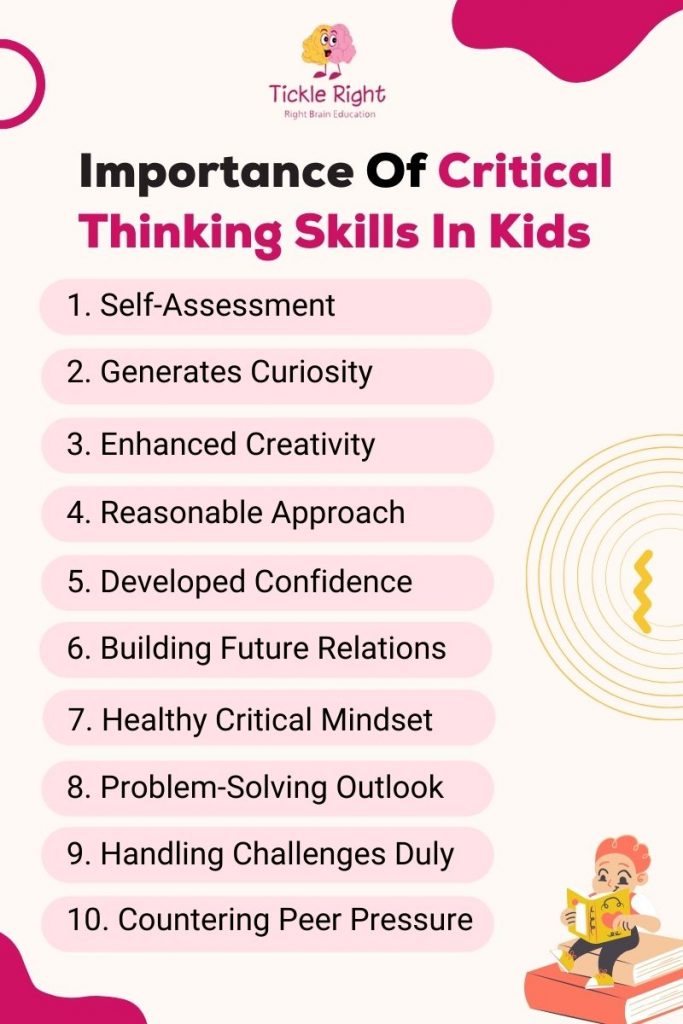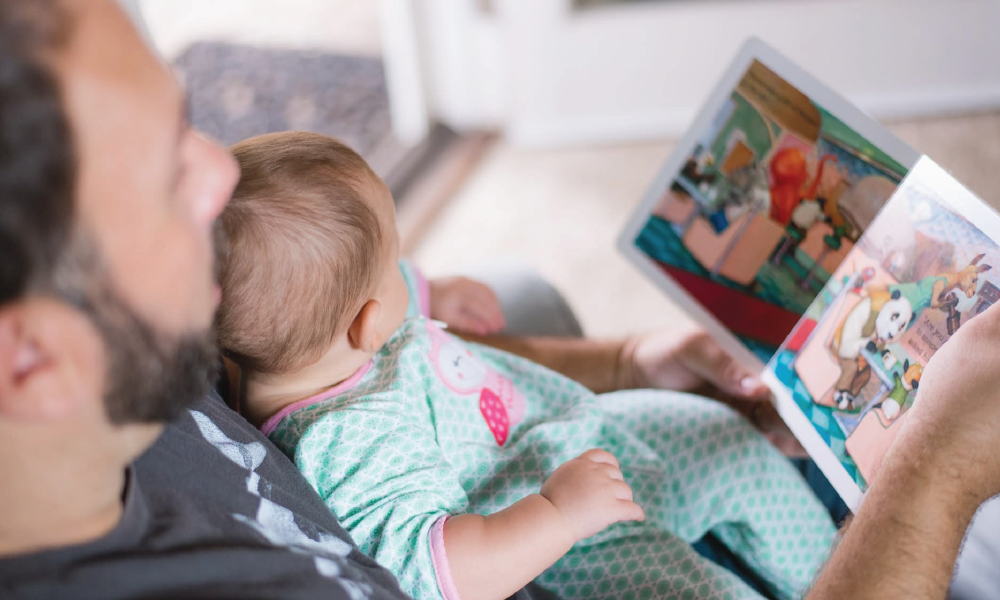Parents’ Guide: How To Develop Critical Thinking Skills In Kids
Parents’ Guide: How To Develop Critical Thinking Skills In Kids
How to teach your child to be a critical & analytical thinker? Well, that’s a question that is being completely addressed in this blog. Kids are generally curious about a lot of things happening around them. And as parents, it’s your responsibility to address this curiosity & instill habits that will sharpen & strengthen your kid’s mind. Critical thinking skills are an amalgamation of awareness, understanding, analysis, & reaction. Which makes it more critical to understand these stages & help your kid accordingly.
The right answer to every “Why” & “What” question popping up in their heads is an opportunity for you to get their minds rolling. It’s also important to build up a need that makes your little one question & automatically react to their surroundings & present emotions. In fact, allow them to think through & express their observations. You can also analyze & correct them, if necessary. The purpose of doing this is to let them separate the information they have gathered & answer relevantly.
We at Tickle Right, fulfill the requirements of a child’s critical mind. We prepare your little one to leave their nest & make critical observations part of their lives. This will not only help your child be academically sound but also be a great thinker. Critical thinking for kids is a way to help them contemplate the environment & develop skills like – leadership, confidence, empathy, communication, & problem solving duly. And that;’s why it’s important to build such a skill set.
What Is Critical Thinking In Kids?
Critical Thinking skills determine the potential to be aware, thoughtful & be able to evaluate the information from the surroundings to develop a problem-solving approach. These skills help a child develop a critical approach towards, analyzing problems finding solutions, & building opinions duly. When your child evolves as a critical thinker from this age, that’s a life skill your child invests into by developing reasoning skills for the future.
Critical thinking is also associated with creativity & making smart decisions accordingly. The glitters of creativity may accompany your little one during childhood to a lifetime. However, the main objective of developing such skills in a child is to empower the little one to be active & careful while tackling obstacles & challenges.
This approach is also necessary for a better tomorrow. In the real world, it’s not always a direct correct or incorrect answer, but you have to think through it. When a kid uses the cognitive skills to conclude, this leads to affective empathy, persuasion, & productivity in a task. In short, your child’s critical approach & enhanced creativity will prove to be an asset in the future.
Importance Of Developing Critical Thinking Skills In Kids

Critical thinking in kids is important for various reasons. A child’s brain & cognitive development is not only aimed to determine success academically, instead of from a wholesome perspective. That means, we believe critical thinking has a wide scope of opportunities lined up for your kid in the future. Not only in terms of academics or problem-solving approach but by developing empathy & building happy relationships in the future.
Amongst other things, read ahead to the importance of critical thinking in kids –
- Generates Curiosity
- Reasonable Approach
- Healthy Critical Mindset
- Building Future Relations
- Countering Peer Pressure
- Problem-Solving Outlook
- Handling Challenges Duly
- Self-Assessment
- Enhanced Creativity
- Developed Confidence
Critical thinking skills develop a mindset that is helpful in handling pressure, obstacles, & understanding the surrounding environment. Sometimes the best way to teach critical thinking to your kid is by the means of activities, games, open-ended questions, storytelling, & others. Read ahead to find out.
Is Critical Thinking Hard To Teach?
The simple answer is ‘No’. What matters here is the right strategy, methods, and a deep understanding of the concept to convey the information in the right manner. The correct way to do so is by asking the right questions & encouraging unique solutions. However, we at Tickle Right, shape your child to be a problem solver & be able to make rational choices most importantly. This also means going beyond and feeding them the right solutions to interpret on their own for future understandings.
How To Develop Critical Thinking Skills In Children?

There are several ways of developing critical thinking skills in your child. For example, putting up open-ended questions to your child like “What now? What do you think?” while appreciating their previous efforts will help you to build a conversation.
While on the one side, you can also opt for right-brain training activities that are aimed to focus on skill-building & long-term memory. Whereas, the below-mentioned tips & ideas will help your child start today to become better thinkers & problem solvers.
-
Encourage Them To Ask Questions
Young children often tend to ask a lot of ‘What’ & ‘Why’ questions. So, when your kid is allowed to express curiosity & an opinion for or against it, it helps them feel about a proposition in a certain way. This also develops critical thinking. In a way, if you back your child’s discourse by logic & correct reasoning, it will help your child grow immensely. Even the most illogical questions must be answered & explained from an early age with suitable examples. You can also counter-question them to form a reaction.
-
Be Patient & Avoid Intervening
Being patient is the first step to developing reasoning skills in your kid. Even if you want to, don’t directly jump to conclusions. Move slowly & allow your child to think for a while. You can always short questions & give them enough time to compartmentalize the information in their head. This will also result in systematic delivery of response as your child will have enough time to answer & run their assumptions by you.
-
Develop Hypothesis With Them
While engaging in some daily extracurricular activities, you can form suitable hypotheses during the play. Simply putting up questions like “What will happen if I add two more of these?” or testing any other kind of responses is a way to encourage critical thinking. You must always test your child’s knowledge without putting undue pressure. Do not expect your child to answer correctly all the time & obey what you ask them to do. Instead, encourage your child to think independently.
-
Help Them Come Up With Different Solutions
By allowing your child to think through, you can help them build a critical mindset. So at the time when your child is trying to analyze a situation, it’s your responsibility to help them think differently. Guide your kid via simple steps & help them come up with unique solutions. Another role as a parent is to boost your child’s morale in case of a downside. Your behavior & response will influence your child’s perspective in various ways.
-
Preach Flexible Thinking
You cannot expect your child to exactly follow what you teach them. However, this is also something that rejects the concept of developing critical skills in a child. Your child must have the flexibility to express their opinions & ask questions duly. And as parents, you must be their role model to help them learn to be problem solvers. Although, you must always discuss the implications of activity but in a relaxed & emotion-provoking manner. This will help your child understand the depth of any situation & make decisions accordingly.
-
Include Co-Curricular Activities
The best way to develop a critical thinking approach is by adding extracurricular activities to the daytime schedule. Activities like art, coding, robotics, chess, sports, flashcards games help a child think critically. This also gives your kid a chance to make the best out of their talent & express strategic moves in the cover of gameplay. Not only this, but these activities will also help them connect in the process& strengthen their ability to be a critical thinker.
FAQs
-
What is critical thinking in early childhood?
Critical thinking in early childhood is a means for your child to think clearly & logically about the knowledge gathered from a concept or between ideas. A younger child at this stage is full of curiosity and it’s essential to convert such inquisitive thinking into something rational. This also sets the stage for further development both in terms of academics & personality building. Furthermore, it’s important to engage your kid in activities that help them build an independent thought process. Rather than giving your child straight answers, attempt to let them –
- Examine
- Compare
- Think
- React
- Process
Do not intervene immediately & help them think through.
-
What are five critical thinking skills?
Given below are the 5 critical thinking skills that your child will sooner or later encounter for high-end cognitive development.
- Understanding Surroundings
- Free Interpretation
- Curiosity & Analysis
- Explanation & Reaction
- Outcome/Problem-Solving
-
At what age do children develop critical thinking skills?
By the time, a child turns 2 to 3 years, this is the right time to start laying the foundation for cognitive development. A child’s mind at this age questions the logical link between its surroundings and the world around it. This allows your child to form open-ended questions & analyze what’s going around them. And as parents, by encouraging your little one, you can fill them in rational answers in the most simple manner.
Takeaway
Critical reasoning & observation is linked to long-term benefits in the future. And as parents, it’s your responsibility to evolve them as great thinkers & robust decision-makers. These skills are life skills & situations that come into a life of a kid can shape them for a lifetime, if handled correctly.
We at Tickle Right, make sure that your child not only develops the ability to think critically & but enjoys doing it. What we’re suggesting is that we empower your child to think critically just as a part of their daily lives. In today’s world, building effective communication & self-assessment skills are as important as thinking out of the box.

